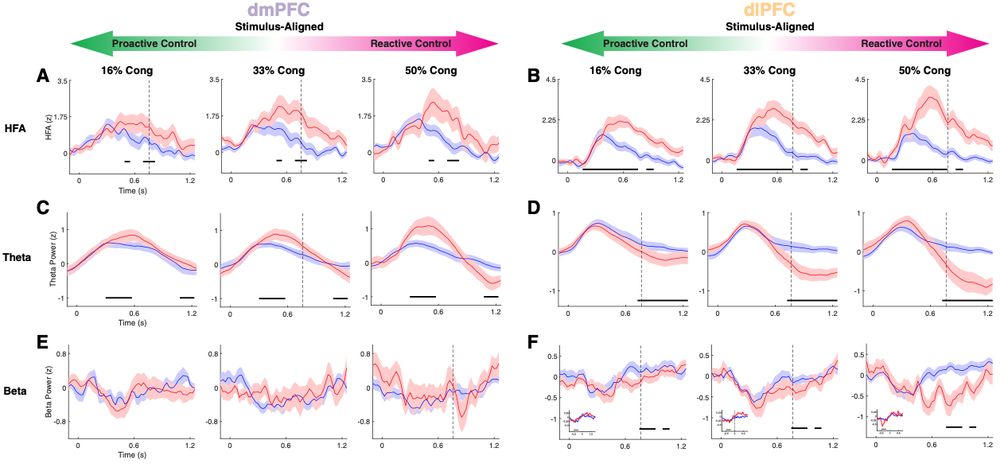
Colin Hoy
@colinwhoy.bsky.social
Postdoc@UCSF on the job market; I study mood & motivation in Parkinson's disease via iEEG, DBS, and RL + #neuroethics | neuro PhD | he/him
This is by n large my take. I hope innovations in #neurotech + computational psychiatry will break through in ways that decades of cog neuro haven't.
That said, I've come around to the (complimentary) clinical/engineering perspective: iterating on therapies can make progress w/o full understanding.
That said, I've come around to the (complimentary) clinical/engineering perspective: iterating on therapies can make progress w/o full understanding.
October 26, 2025 at 2:52 AM
This is by n large my take. I hope innovations in #neurotech + computational psychiatry will break through in ways that decades of cog neuro haven't.
That said, I've come around to the (complimentary) clinical/engineering perspective: iterating on therapies can make progress w/o full understanding.
That said, I've come around to the (complimentary) clinical/engineering perspective: iterating on therapies can make progress w/o full understanding.
That said, % cong is a weaker manipulation, which might be why we didn't see pre-trial theta predicting behavior or clear modulations of coherence/connectivity. Cued designs are probably better to drive the system and explore those effects, though claiming it's proactive vs reactive gets messy. 2/2
October 11, 2025 at 7:10 PM
That said, % cong is a weaker manipulation, which might be why we didn't see pre-trial theta predicting behavior or clear modulations of coherence/connectivity. Cued designs are probably better to drive the system and explore those effects, though claiming it's proactive vs reactive gets messy. 2/2
This looks really nice, sorry we didn't cite it! I like that implicit block-level expectations in our non-cued design can drive pre-trial MPFC theta boost, so good evidence supporting it as a proactive control signal. 1/2
October 11, 2025 at 7:04 PM
This looks really nice, sorry we didn't cite it! I like that implicit block-level expectations in our non-cued design can drive pre-trial MPFC theta boost, so good evidence supporting it as a proactive control signal. 1/2
Thanks! I'd say MPFC seems to reflect that preparation of control, and I think we need follow ups to test its causal role (ie how much does the pre-trial MPFC signal matter?). Our data can't really speak to the learning that leads to that anticipation, but both regions are reacting in the moment.
October 10, 2025 at 12:41 AM
Thanks! I'd say MPFC seems to reflect that preparation of control, and I think we need follow ups to test its causal role (ie how much does the pre-trial MPFC signal matter?). Our data can't really speak to the learning that leads to that anticipation, but both regions are reacting in the moment.
I believe in PAC generally, but it's so persnickety! In human iEEG, you can find that one, beautiful black swan contact that matches exactly what you predict, but it rarely pans out at the group level. Maybe it's just sampling bias, and denser recordings or intentional targeting would find it?
October 9, 2025 at 1:53 AM
I believe in PAC generally, but it's so persnickety! In human iEEG, you can find that one, beautiful black swan contact that matches exactly what you predict, but it rarely pans out at the group level. Maybe it's just sampling bias, and denser recordings or intentional targeting would find it?
Punch line: We found that MPFC theta increased just before trial onset when conflict was expected, revealing a putative mechanism for proactive control!
I future studies will explore and even manipulate this proactive theta signal in MPFC to test causal relevance for cognitive control.
5/5
I future studies will explore and even manipulate this proactive theta signal in MPFC to test causal relevance for cognitive control.
5/5

October 8, 2025 at 9:12 PM
Punch line: We found that MPFC theta increased just before trial onset when conflict was expected, revealing a putative mechanism for proactive control!
I future studies will explore and even manipulate this proactive theta signal in MPFC to test causal relevance for cognitive control.
5/5
I future studies will explore and even manipulate this proactive theta signal in MPFC to test causal relevance for cognitive control.
5/5
Interestingly, all these signals were amplified when participants reacted to unexpected conflict, and they were suppressed when they anticipated (common) conflict. Pretty cool to see these canonical conflict signals nearly disappear when proactive control is prepared!
4/5
4/5

October 8, 2025 at 9:07 PM
Interestingly, all these signals were amplified when participants reacted to unexpected conflict, and they were suppressed when they anticipated (common) conflict. Pretty cool to see these canonical conflict signals nearly disappear when proactive control is prepared!
4/5
4/5
In both regions, we confirmed classic control signals where conflict boosted theta (4–8 Hz) & local high-frequency activity. We also saw that conflict modulated beta (13–30 Hz) rhythms and suppressed theta after the response.
3/5
3/5

October 8, 2025 at 9:05 PM
In both regions, we confirmed classic control signals where conflict boosted theta (4–8 Hz) & local high-frequency activity. We also saw that conflict modulated beta (13–30 Hz) rhythms and suppressed theta after the response.
3/5
3/5
Many studies show cognitive control signals in MPFC & LPFC, but how these regions adapt their dynamics when control shifts from reactive (conflict-triggered) to proactive (anticipatory) is less clear.
To study this, we recorded iEEG during proportion congruent manipulations in a Stroop task.
2/5
To study this, we recorded iEEG during proportion congruent manipulations in a Stroop task.
2/5

October 8, 2025 at 9:03 PM
Many studies show cognitive control signals in MPFC & LPFC, but how these regions adapt their dynamics when control shifts from reactive (conflict-triggered) to proactive (anticipatory) is less clear.
To study this, we recorded iEEG during proportion congruent manipulations in a Stroop task.
2/5
To study this, we recorded iEEG during proportion congruent manipulations in a Stroop task.
2/5
Hi Malu, thanks for sharing! The language seems pretty broad, but do you know if they're open to human subjects neuroscience research?
September 30, 2025 at 1:01 AM
Hi Malu, thanks for sharing! The language seems pretty broad, but do you know if they're open to human subjects neuroscience research?
Hell yeah, congrats Richard!! Can't wait to see what you get up to
September 29, 2025 at 4:56 PM
Hell yeah, congrats Richard!! Can't wait to see what you get up to
I agree this feels like an "intuitive" result, but I can imagine how formalizing strongly predictive mappings between arousal and current brain state dynamics (esp for human brains) might help parse large-scale activity into ongoing dynamics ("noise") and target mental processes
September 28, 2025 at 6:22 PM
I agree this feels like an "intuitive" result, but I can imagine how formalizing strongly predictive mappings between arousal and current brain state dynamics (esp for human brains) might help parse large-scale activity into ongoing dynamics ("noise") and target mental processes
How many years (and tears?) would Al Patching have saved you in your PhD? Asking retrospectively for a friend...
September 18, 2025 at 7:07 PM
How many years (and tears?) would Al Patching have saved you in your PhD? Asking retrospectively for a friend...

